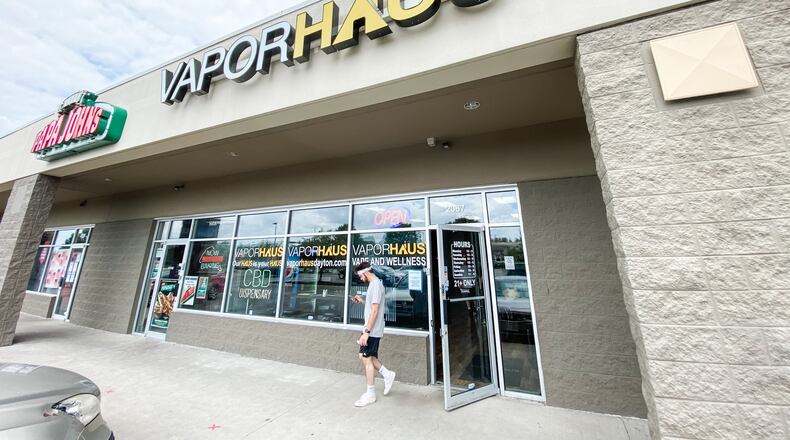“There remains a clear and present danger on store shelves across the state by way of unregulated, untested and unsafe products containing Delta-8 THC that are easily obtainable by Ohio’s youth,” Division of Cannabis Control spokesperson Jamie Crawford said. “As the Division prepares to introduce products that have met its highest standards of testing and safety, all of which will carry the DCC seal, we must ensure dangerous, unregulated products such as Delta-8 are removed from circulation.”
But businesses that sell these products ask for regulation, not total elimination.
“I think the state should oversee what’s being sold and make sure it’s sold in safe places, but I don’t think an all-out ban solves the problem,” said Chris Voudris, co-founder and CEO of Vapor Haus. “One of the biggest challenges the state will have if they decide to ban these products is black market.”
Delta-8 products, along with some other members of the “Delta” family, were made legal under the 2018 Farm Bill, which effectively legalized hemp and hemp-derived products on the federal level. Under that law, hemp is considered to have only 0.3% delta-9 THC.
Delta-8 produces a marijuana-like high. It is largely unregulated and does not go through the same sets of testing as products that will be sold by licensed recreational cannabis sellers.
Such cannabinoids exploded in popularity in recent years as marijuana remained illegal for recreational use. They are now sold in smoke shops and even gas stations across the region.
State leaders like Ohio Gov. Mike DeWine have called for lawmakers to pass laws to take hemp-derived products out of circulation, pointing to concerns with teens’ easy access to them and the lack of testing requirements the products must meet before sale.
Businesses self regulate
Voudris’ vape business with 12 locations in the Dayton area sells an array of vape products and accessories, as well as Delta-8 and CBD products. He says responsible companies like his are taking measures to ensure safety.
Voudris works with companies that can show a lab test sheet with their products to show what’s inside, and his employees are trained to know what they’re selling. His shops don’t sell products to people under the age of 21 and their products come in childproof packaging.
“The state hasn’t liked the idea of minors getting these products, and we don’t, either,” Voudris said. “And I think that’s what sets us apart from a gas station or a drive-thru that may have some Delta products and who have employees who maybe aren’t informed as much.”
Voudris does not think interest in hemp-derived products will wane given the introduction of recreational marijuana sales; in fact, he thinks the two products can coexist peacefully.
Voudris said his business has found many customers like that Delta-8 offers more of an effect than CBD but less of an effect than medical-grade marijuana.
“It gives someone a chance for someone to have a lighter dose than what’s out there on the medical side and not have to jump through so many hoops,” he said.
Centerville Vapor Haus customer Josh Mueller said he uses nicotine vape products regularly, but he once used hemp-based products to deal with pain from an injury.
He said he’s skeptical of the state’s desire to take hemp-derived products off the shelves.
“Now that they have their hands on things, they just want to make it so they’re making all of the money,” he said. “That’s exactly why they want to take Delta-8 and other things away.”
Regulators speak up
The Division of Cannabis Control is given regulatory authority over marijuana as it is defined in the Ohio Revised Code. This means the agency has no control over non-regulated hemp products, and the state has no ability to require testing to ensure the safety of such products.
“There must be a comprehensive approach to managing cannabis use within the state, and the governor and his administration remain ready to work with the General Assembly to make that happen,” said Crawford.
Medical marijuana, and in the future non-medical cannabis, is tested for THC potency and contaminants at state-licensed independent testing laboratories.
“When someone purchases a product from a licensee that carries the Division of Cannabis Control or Medical Marijuana Control Program seal, consumers can know that product meets our highest standards of testing and safety,” Crawford said.
About the Author

